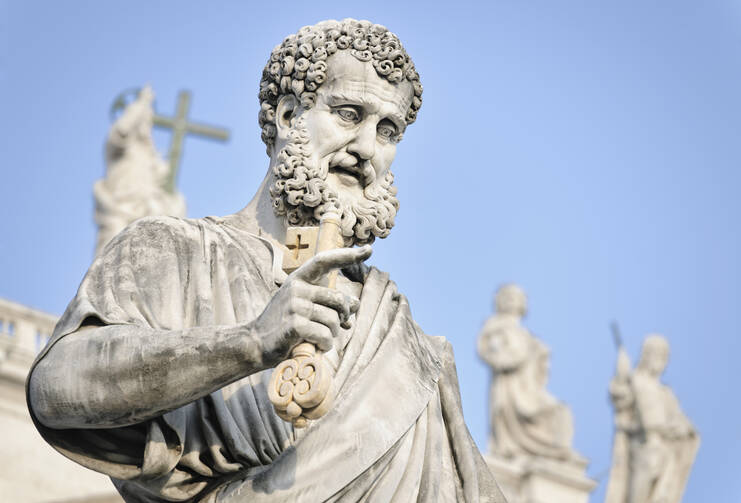A Reflection for the Solemnity of Saints Peter and Paul, Apostles
Find today’s readings here.
“And so I say to you, you are Peter,
and upon this rock I will build my Church,
and the gates of the netherworld shall not prevail against it” (Mt 16:18).
“The Lord stood by me and gave me strength,
so that through me the proclamation might be completed
and all the Gentiles might hear it” (2 Tim 4:17).
Growing up, few things made me more uncomfortable than seeing parents fight. I remember well sitting in the back of my soccer buddy’s PT Cruiser while her mom and dad were at each other’s throats over a wrong turn or something one of them had forgotten at the house. My friend seemed unfazed, but my parents were not yellers, so this was a different and unsettling experience for me.
I have a similar feeling when I think about St. Peter and St. Paul not getting along. After all, they are the pillars of the Catholic Church: Peter, the rock upon which Christ has built his church, and Paul, the great missionary and evangelist who wrote much of the New Testament. Yet the two famously and forcefully did not agree on one of the most fundamental questions facing the early church: Whether a Gentile must become a Jew and observe Jewish customs in order to be a good Christian. Peter initially said yes, and Paul argued no.
Paul eventually won out, but not before he had publicly called out Peter: “And when Cephas came to Antioch, I opposed him to his face because he clearly was wrong” (Gal 2:11). If I had been in the crowd witnessing this confrontation, I imagine I’d feel very similar to 11-year-old Ashley in the back on that PT Cruiser. (And like most kids, I would have felt the need to pick a side, in this case, Peter’s. Who was this upstart Paul, who never even met Jesus, to undermine Peter’s authority like that?)
There is little evidence in the Bible that the two fully embraced one another or reconciled after this roe and simply went their separate ways. Yet since the ancient church, we have celebrated the two apostles on June 29 in honor of their martyrdom in Rome.
“Christian tradition has always considered Saint Peter and Saint Paul to be inseparable: indeed, together, they represent the whole Gospel of Christ,” Pope Benedict said on the Feast of Sts. Peter and Paul in 2012.
The church needs both these great apostles not in spite of their differences but because of their unique positions and gifts. Then and today, the church needs the stability and rootedness of the institution that Peter embodies as well as the restless, missionary impulse that pushes Paul to foreign lands to proclaim the Gospel to humanity in all its diversity.
As a Christian, I find that the saints embody and rebut two fears that so often plague my spiritual life: that I am not worthy and I cannot change. Christ chose Peter, a poor, unsuccessful fisherman from a backwater town, to shepherd his flock. And Christ struck down Paul, a persecutor of Christians, on the road to Damascus and gave him the strength to become his great evangelist.
I still don’t like confrontation. But I take comfort knowing that our church, despite its deep divisions, is not only big enough for two saints as different as Peter and Paul; the church needs two men as different as Peter and Paul. Whatever their disagreements, they shared something far greater: death in Christ’s name and life eternal in heaven.








